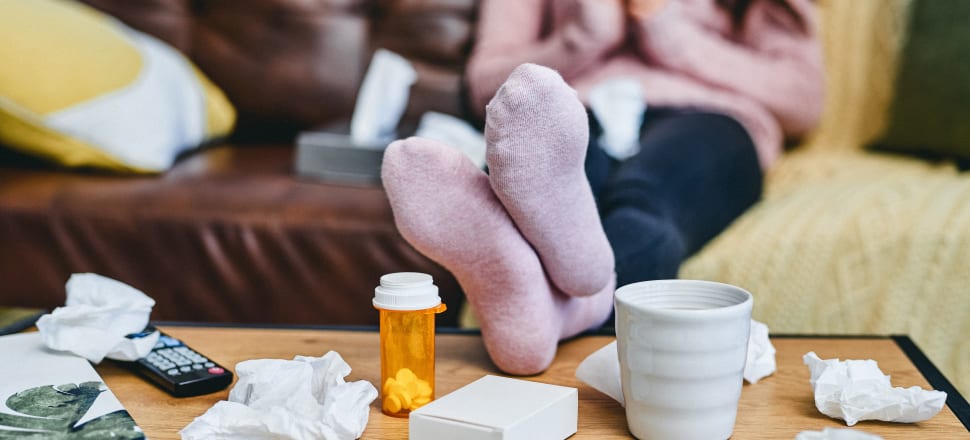
We're clocking up more sick leave than ever before, but have we really taken on board one of the most important lessons of the pandemic - to stay home when we're sick?
For years when we've had colds, flus and other lurgies, we've been expected to soldier on, dosing up on meds and going to work, school and social events.
Then along came Covid-19 - and the loud and clear message to stay home when we're sick.
But is that realistic for everyone?
What is sick leave for?
AUT Professor of Human Resources Management Jarrod Haar says sick leave is there to help people recover.
"It's to say, hey, if you're unable to come to work because you're sick for whatever reason - whether it's a pulled muscle or the flu, Covid - you're not going to be disadvantaged and unpaid while you're recovering.
"As we've got smarter, I think we've also realised that actually, bringing sick people into the workplace is detrimental because they sneeze and cough, spread the germs around and then we could end up with more people in the workplace being sick and needing time off."
How much sick leave do we get?
For employees - that's most people earning wages or a salary - you get at least 10 paid sick days a year. It used to be five days, but the Government made changes last year to double the minimum entitlement.
Some workplaces offer more than the minimum, or even uncapped sick leave.
However, you only become eligible for paid sick leave when you’ve been in a job for six months, which is a problem for people doing seasonal or temp work. The Government has signalled it's looking at further law changes to allow people to accrue sick leave from day one.
Sick leave is also a problem for contractors. There are 350,000 people who fall into the category of 'self-employed without employees' and these people don't get any sick leave. This is another area the Government is looking at possible solutions to ensure contractors have extra protections.
How much sick leave are we taking?
According to Stats NZ, in the three months to March, 44,200 employed people were away from work for a full week because of sickness, illness or injury - up two-thirds on the same period last year. It’s also the highest it's been in the past five years. Stats NZ attributed the jump to the increase in Omicron cases in the community.
Stats NZ says there was also a 21 percent increase in the number of people who said they were working fewer hours in a week than usual because they were sick, ill or injured.
What happens if you max out your sick leave?
If you run out of sick days, but get sick again, it's up to your employer to decide whether they’ll keep paying you or not.
Employment lawyer Barbara Buckett says employers need to be fair and reasonable when considering people’s situations. She says some employees may be able to challenge a refusal not to grant further paid sick leave, on the grounds they’re being disadvantaged, but this is time-consuming and costly.
If your employer offers uncapped sick leave, or more than the minimum 10 days, this may not be so much of a problem for you. However, employers can ask for medical certificates - at their cost - to verify people are unable to work.
Are people still going to work when they’re sick?
They could be. We're in the midst of a cost of living crisis and Haar says people may not be able to afford to take unpaid sick leave. Haar says international research shows sick workers who don't have any more paid leave, or contractors who don't get paid if they don't work, will keep going to work while sick. Haar says those people are likely to be less productive - and there's the risk they'll spread colds and flu to others. But some people are facing considerable financial pressure.
"Banks and landlords don't say, 'Hey, I realise you've had a poor week of health this week, don't worry about paying the mortgage or the rent, that one's on me'. It's going to make workers who aren't well still continue to work," Haar says.
Find out how to listen and subscribe to The Detail here.
You can also stay up-to-date by liking us on Facebook or following us on Twitter.








